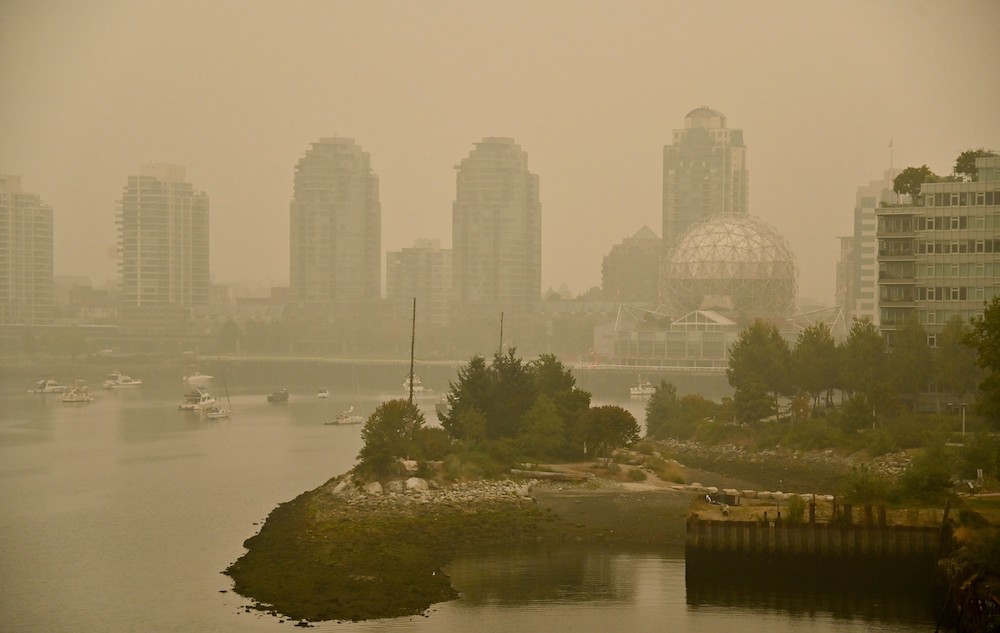British Columbia's Climate Change Accountability Act does not require the government to tell the public if it is on track to hit its long-term provincial climate commitments, according to a Tuesday B.C. Supreme Court decision.
The province was in court defending itself against a lawsuit from the environmental organization Sierra Club BC, represented by the non-profit law firm Ecojustice.
Sierra Club BC argued that under the Climate Change Accountability Act, the government should produce a plan to hit its climate targets and include a detailed breakdown of how close that plan comes to success or failure.
Both pieces of information are necessary in order for politicians and the public to make informed decisions about climate change, Sierra Club BC said.
A judge disagreed, ruling that the province's current reporting on its progress fulfilled the act’s requirements.
In his ruling, judge Bill Basran said it was “laudable” that Sierra Club BC wanted to clarify the “expected results of B.C.’s climate change initiatives,” but that was not required under the act.
The act only required detailed reporting on the current and next two years, Basran said in his ruling.
Basran also noted the government is not legally obliged to meet its climate goals and there are no penalties if it misses them. He said it was “disappointing” that B.C. was on track to overshoot its 2025 emissions target by two megatonnes of carbon dioxide equivalent (producing a projected total of 57.5 megatonnes of CO2 equivalent that year) and would likely miss its 2030 targets too.
That's the bad news for environmentalists, says Andhra Azevedo, staff lawyer with Ecojustice. If British Columbians want more details about how their government is working to reduce emissions and combat climate change, they'll need to push for stronger accountability laws, she told The Tyee. The Sierra Club BC has until Feb. 16, 2023, to appeal the decision.
In its lawsuit, Sierra Club BC said the government’s reports weren’t detailed enough because the 2021 Climate Change Accountability Report, an annual report about provincial emissions, did not include specific plans to meet the provincial 2025, 2040 or 2050 targets, or the oil and gas sector target for 2030.
Emissions reductions targets create a roadmap for how B.C. will radically reduce its greenhouse gas emissions and prevent climate change from worsening.
The past few years in B.C. have witnessed worsening floods from atmospheric rivers and sea level rise, catastrophic wildfires, droughts and heat waves.
The planet has only warmed around 1.14 C from pre-industrial temperatures. There is a global movement to reduce greenhouse gas emissions and prevent the planet from warming more than 2 C, ideally only by 1.5 C.
To do its part B.C. has pledged legislation to cut its emissions by 16 per cent below 2007 levels by 2025, 40 per cent by 2030, 60 per cent by 2040 and 80 per cent by 2050. It has also pledged to reduce emissions from the oil and gas sector by up to 33 to 38 per cent by 2030.
In a statement, the Ministry of Environment told The Tyee it was pleased with the ruling and that its accountability reports were “helping ensure we stay on track to meet our targets.”
The statement did not mention how B.C. is on track to miss its 2025 and 2030 targets.
Regardless of whether it’s legally required to or not, government needs to do more to educate the public about the progress B.C. is making towards hitting its climate commitments, says Jens Wieting, senior forest and climate campaigner and science advisor at Sierra Club BC.
Without more transparency on emissions reporting, Wieting fears that B.C. will maintain an “extreme cognitive dissonance” on climate change — meaning, for example, the province will continue building out fossil fuel projects in the middle of a climate crisis.
A specific example of this is how the government says it can hit its 2030 oil and gas sector target, which requires the industry to reduce its emissions by nearly 40 per cent, while building the new LNG Canada export facility in Kitimat, B.C., Wieting said.
This one project will increase the sector’s emissions by 24 per cent in 2030, 54 per cent in 2040 and 49 per cent in 2050, according to calculations by the Canadian Centre for Policy Alternatives.
Last week LNG Canada said Phase 2 of the project would be powered by burning fossil gas, also known as natural gas, which means the terminal itself will produce four million tonnes of greenhouse gases annually to cool fossil gas to a liquid state for export and shipping. The company added it would eventually switch to hydro power, but didn’t give a timeline.
These numbers don’t include the emissions from when the fossil gas is eventually burned because Canada doesn’t count emissions on products it exports, including fossil fuels.
The Ministry of Environment did not respond to a question from The Tyee about how the province will be able to reduce emissions while approving new fossil fuel projects.
Without transparent reporting, Wieting questioned how British Columbians will be able to have an informed discussion about what fossil fuel projects to keep and what ones to scrap in order to meet climate targets.
“We have already seen climate disasters in B.C. and know there will be more to come,” Wieting says. “We have a very small window of time left to reduce our emissions and turn things around.”
Overall Tuesday’s decision was not a win for environmentalists, but there is a silver lining, says Ecojustice lawyer Azevedo.
The judge set the precedent that the government can be taken to court if it is not following through on its climate accountability reporting laws, she said, which could spill over into other provincial, territorial or federal jurisdictions too. ![]()
Read more: BC Politics, Environment

















Tyee Commenting Guidelines
Comments that violate guidelines risk being deleted, and violations may result in a temporary or permanent user ban. Maintain the spirit of good conversation to stay in the discussion.
*Please note The Tyee is not a forum for spreading misinformation about COVID-19, denying its existence or minimizing its risk to public health.
Do:
Do not: